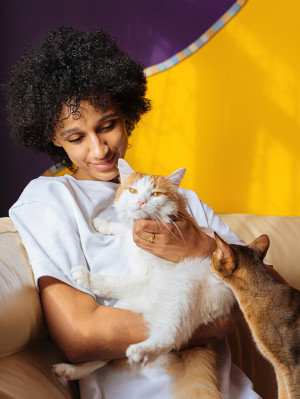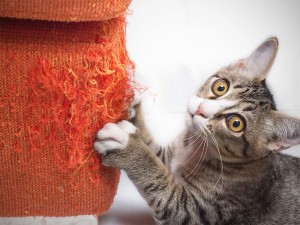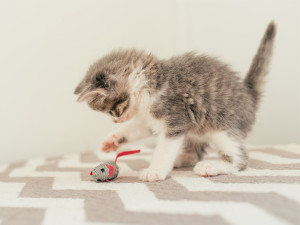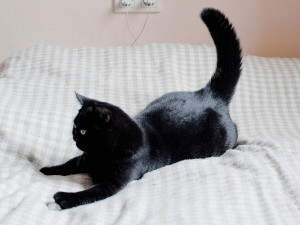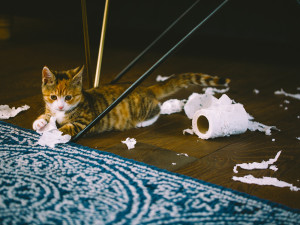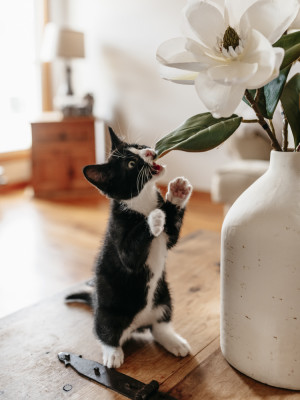Why It’s Time to Stop Using a Spray Bottle to ‘Train’ Your Cat
And how to really get them to stop jumping on the counter
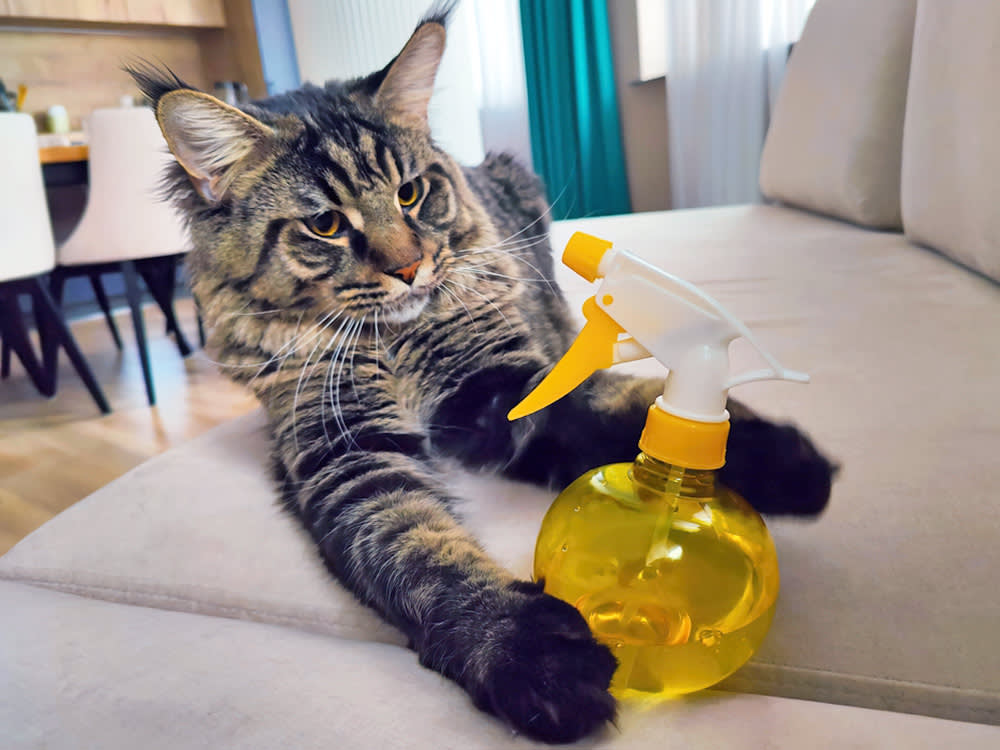
Share Article
Most cats have, at some point, done something annoying. And sometimes they do something super annoying – such as jumping up on the counter or biting at your toes – over and over again. When that happens, it’s logical to wish for a quick fix. For cat parents, there’s a pretty classic technique for stopping a cat in their tracks: the spray bottle. We’ve all seen the image of someone spraying a cat with water to give them a scare. The cat stops mid-action, and voilà – all’s well. Right? Actually, not so much...
Spritzing a cat with water isn’t the simple solution we’ve been sold, and it’s time for us to do away with the practice. According to cat behaviourist Jennifer Van de Kieftopens in new tab, using a spray bottle on a cat is pretty outdated advice – and it won’t work out for you or your cat.
First of all, it’s rude
Using a spray bottle is a form of punishment; you know cats don’t like to be sprayed with water (wet fur can be extremely uncomfortable for cats), so you’re spraying them to upset them. The thing is, your cat doesn’t necessarily understand what they did wrong – so they’re only learning to be scared of you. “Punishment can damage relationships as it breaks the trust,” says Van de Kieft. “The cat doesn’t understand why a behaviour that seems normal and natural for them is being punished. It decreases the trust between the guardian and cat.”
And if you spray over and over again for a variety of reasons, it quickly becomes a terrifying living situation for your cat. Imagine if you lived in a house furnished by a giant who didn’t speak your language, and every time you sat in the wrong place or reached for the wrong thing he gave you an electrical shock. You’d quickly become afraid to do anything. “One of the biggest problems with spraying water is that it can easily turn into abuse,” says Van de Kieft. “Spraying the cat for one thing often leads to spraying the cat for lots of behaviours, which can result in frustration and mistrust on the cat’s part. It becomes abusive, particularly because it’s so confusing to the cat.”
It doesn’t work, either
Most people spray their cat hoping that the cat will get the message and learn what they are and aren’t allowed to do... and then they’ll never be sprayed again. It’s a nice idea, but Van de Kieft says it’s unlikely to happen that way. “In most cases, spraying a cat with water is not effective, particularly for a long-term solution,” she says. “The cat keeps doing it and the guardian keeps spraying the cat.”
Instead of learning, say, not to hop on a counter, your cat learns to sneak around. “What cats learn is that they shouldn’t do the undesirable behaviour in front of you. They will wait to go on the counter when you’re not around or not looking,” says Van de Kieft. Sometimes spraying can even make the behaviour worse, because your cat comes to see you as their adversary rather than someone who has their best interest in mind. For example, Van de Kieft adds that “spraying a cat with water that is displaying aggressive behaviours may increase the agitation level of the cat”.
Alternatives to spray bottles
Avoiding punishment doesn’t mean that you have to just deal with your cat doing whatever they want. To curb unwanted behaviours, Van de Kieft recommends thinking like a cat. “The most important thing is to consider what the cat’s motivation is for the undesired behaviour,” she says. “What do they get out of it?”
Van de Kieft says that counter surfing is a common reason why people spray their cats – it’s a quick way to get them down from where they are. But for them to stay down, you have to think bigger. “If your cat wants to go on the counter, consider why that might be,” she says. “Is your cat looking for a high spot to view their territory? If so, provide an acceptable alternative. Add a cat tree or shelving nearby. Is your cat hungry and looking for appealing crumbs that might be left on the counter? Clean off your counter to ensure there’s nothing interesting that would reinforce your cat for being up there.”
Aggression is another reason pet parents spray their cats, but Van de Kieft says this is totally unproductive. “Cats who have a lot of energy and a strong prey drive sometimes attack ankles and feet. Spraying your cat with water in this instance can increase the level of agitation,” she says. Your cat could think you’re fighting them back, which will only make them bite and scratch more. An eye for an eye won’t work. Instead of harming them back, help them get out their excess energy by engaging in playtime – Van de Kieft recommends having a play session with a wand toy once or twice a day. This will satisfy their prey drive without sacrificing your toes.
When it comes to training a cat, Van de Kieft recommends clicker training. It’s an easy way to teach your cat which behaviours you prefer from them – all while strengthening your bond, rather than weakening it.

Sio Hornbuckle
Sio Hornbuckle is a writer living in New York City with their cat, Toni Collette.
Related articles
![Kitten scratching fabric sofa]()
How to Stop Your Cat From Absolutely Ripping Apart Your Couch
Placing a cat tree or post in a room only, uh, scratches the surface of solving this problem
![A kitten playing with a mouse cat toy.]()
How to Keep Your Kitten From Making You the Toy at Playtime
Your cat deserves to play, but you deserve to walk away unscathed
![black cat doing zoomies on a bed]()
Your Cat’s Erratic Zoomies – Explained
Fast, furious and officially normal – according to a cat behaviourist
![A calico tabby kitten chewing and tearing a roll of toilet tissue.]()
Why Does My Cat Chew On Everything?
How to decode your cat’s chewing habits when they’re nibbling on all the things
How to Stop Your Cat From Munching On All of Your Precious Plants
Tips to get your cat to quit eating your greens
![a tattooed person with curly red hair on a couch pets a brown and black cat]()
Can Your Cat Smell If You’re Stressed?
And will they do anything about it if they do?

